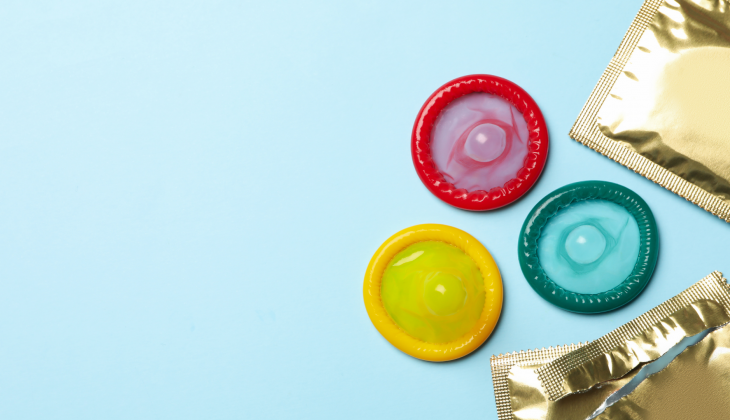Infections transmitted through sex are known as sexually transmitted diseases or STDs. STDs are spread mostly through unprotected sexual intercourse, i.e. sexual intercourse without a condom.
Sexually transmitted infections are caused by bacteria, viruses, fungi, or parasites that can cause many different symptoms and problems. Most STDs in humans primarily affect the reproductive organs. With oral stimulation, pathogens can also be spread in the pharynx. Other diseases, such as HIV, hepatitis B and syphilis can affect your whole body. Since STDs often develop without symptoms, you should consult a doctor if you have even the slightest reason for concern.
Some infections are also spread through blood, skin-to-skin contact or from mother to child during pregnancy, childbirth, or breastfeeding. Some STDs can be cured, others cannot. Undiagnosed and untreated STDs can lead to long-term discomfort and can have life-threatening consequences.
Unprotected sexual intercourse with an infected person is the most common way STDs are transmitted. Infection can be contracted during vaginal, oral, and anal sex. The inner surface of the human vagina, anus, urethra, and mouth is covered with mucous membranes on which micro-organisms (bacteria, viruses, protozoa) that cause STDs live and reproduce. Please note that many birth control products, like contraceptive pills or patches do not protect you from infections!
During unprotected sexual intercourse, these infectious agents can spread from one person’s mucous membranes to the other. It makes no difference whether the sexual partners are of the opposite or the same sex – everyone is at risk of infection if they have unprotected sex.
Modes of transmission of sexually transmitted diseases:
- STDs are most commonly passed through unprotected sexual intercourse.
- Wound-transmitted infections can also spread by skin-to-skin contact.
- HIV and hepatitis C are transmitted by blood contact, for example by sharing needles.
- Most STDs can be passed from mother to baby during pregnancy and childbirth and can have harmful repercussions for the new-born. For example, a mother who is infected with gonorrhoea conjunctivitis can infect her new-born, leading to the child’s loss of sight unless preventative treatment is provided. In Estonia, women are screened during pregnancy for syphilis, HIV and hepatitis B, as well as other sexually transmitted diseases. If you have had unprotected sex or are pregnant, it is important to inform your doctor about any complaints you or your partner may have. Tests and treatment can be carried out if necessary, in order to protect the health of you and your child.
- Scabies and pubic lice are spread through close physical contact and bed linen.
How to protect yourself against STDs?
The safest way to prevent sexually transmitted infections is to use protection during sexual intercourse. PS! Contraceptives are not a form of protection – use condoms and protective films (e.g. for oral sex).
Have safe sex and do not let your partner’s sperm, blood or vaginal secretions enter your body. The fewer sexual partners you have, the lower the chance of getting infected. Some sexually transmitted diseases can be prevented with vaccines.
How to find out if you have an STD?
You will not be able to tell from images and descriptions alone whether you or your partner have an STD, as symptoms vary widely from person to person or are completely absent. Some STDs have symptoms that come and go. This does not mean that the infection has receded.
What to do if you are diagnosed with an STD?
If you are diagnosed with an STD you need to inform your sexual partners, so that they too can get checked and treated promptly, if necessary. Some STDs, most notably chlamydia and gonorrhoea, can progress without symptoms and therefore you may not be aware that you are infected! But even symptom-free STDs can cause long-term health problems. Regardless of whether symptoms are present or not, unprotected sexual intercourse can lead to the infection of another person or to becoming infected yourself.
If you have any of the symptoms mentioned, contact your doctor (GP, gynaecologist, urologist, skin and STD dermatologist). Testing is the only way to find out if you are infected.
As the disease will not go away on its own, timely medical treatment is essential. Most STDs have effective treatments available today that will help prevent problems in the future.
The article was prepared using the HIV website of the National Institute for Health Development www.hiv.ee and the website of the Estonian Sexual Health Association www.seksuaaltervis.ee.
The Estonian Sexual Health Association is an advocacy organisation for sexual and reproductive health and rights.
The National Institute for Health Development is a public research and development institution which conducts research on public health, disease prevention programmes and activities and promotes health.
Published in the youth information portal Teeviit in 2022.







